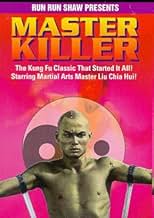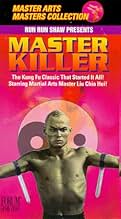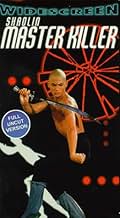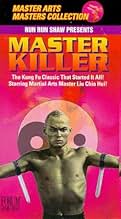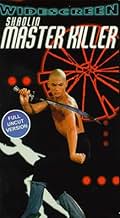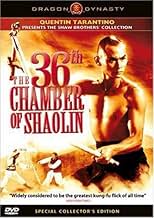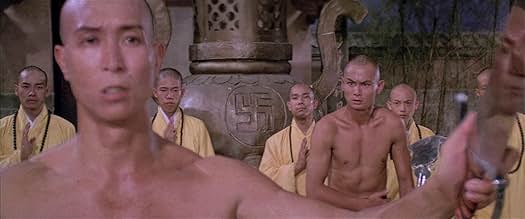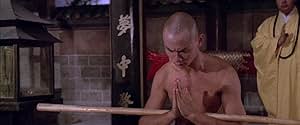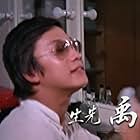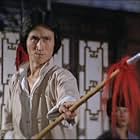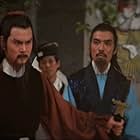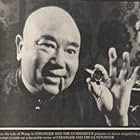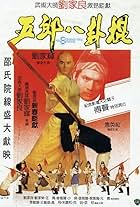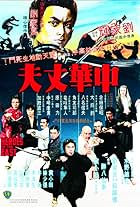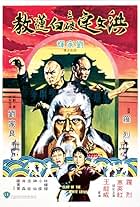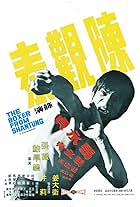IMDb RATING
7.6/10
19K
YOUR RATING
A school student who conspires with his teacher and others to overthrow the Qing Dynasty sees his family slaughtered at the hands of his enemies. He joins the Shaolin Temple and rigorously s... Read allA school student who conspires with his teacher and others to overthrow the Qing Dynasty sees his family slaughtered at the hands of his enemies. He joins the Shaolin Temple and rigorously studies martial arts to avenge his beloved ones.A school student who conspires with his teacher and others to overthrow the Qing Dynasty sees his family slaughtered at the hands of his enemies. He joins the Shaolin Temple and rigorously studies martial arts to avenge his beloved ones.
- Director
- Writer
- Stars
- Awards
- 1 nomination total
Lo Lieh
- General Tien Ta
- (as Lieh Lo)
Yue Wong
- Miller Six
- (as Yu Wang)
Liu Chia-Yung
- General Yin
- (as Chia-Yung Liu)
Norman Chu
- Lu Ah-Tsai
- (as Shao-Chiang Hsu)
Yung Henry Yu
- Hung Hsi-Kuan
- (as Yang Yu)
John Cheung
- Lord Cheng
- (as Wu-Liang Chang)
Wilson Tong
- Tang San-Yao
- (as Tang Wei-cheng)
Hoi-Sang Lee
- Abbot of Justice Office
- (as Hai-Sheng Li)
Kwok-Choi Hon
- Lin Chen
- (as Kuo-Tsai Han)
- Director
- Writer
- All cast & crew
- Production, box office & more at IMDbPro
Featured reviews
10dee.reid
Anyone familiar with the hip-hop super-group the Wu-Tang Clan knows that "The 36th Chamber of Shaolin" (a.k.a. "Shaolin Master Killer"), directed in 1978 by Liu Chia-Liang, is essential viewing for any martial arts movie fan. This movie started the whole "good-guy-gets-his-butt-kicked-and-undergoes-martial arts-training-to-exact-vengeance" storyline that's been used so many times in the martial arts movies since (i.e., the American "Karate Kid" movies). In it, anti-Manchu patriot San Te (Gordon Liu) is a humble country boy who is cast out of his village when Manchu soldiers (led by the villainous Lo Lieh) slaughter his parents, orphaning him. He manages to make it to the famous Shaolin Temple, where he is nursed back to health by the monks living there, and soon undergoes a rigorous and dangerous regiment of training to master the 35 "chambers" (styles) of kung-fu. In seven years, he completes his training, mastering all 35 styles, invents a brand-new weapon (the three-section staff), and suggests creating a 36th chamber - to spread kung-fu beyond the Shaolin Temple's walls and bring it to the masses. The whole story is pretty formulaic (what martial arts movie from the '70s doesn't have a formulaic plot?), but what gets this movie going is its rousing training sequences. These are not the run-of-the-mill stuff we're used to seeing in these movies. San Te's quest to become a martial arts warrior is a tortuous journey of self-actualization, a kind of virtue commonly lacking in the genre; San Te actually becomes a better person as a result of his experiences at the Shaolin Temple. Most grind-house cinema aficionados love this movie (Wu-Tang Clan co-founder the RZA in "The Wu-Tang Manual" does an entire section on the martial arts movies that influenced his development of the Wu-Tang Clan and much of their underlying philosophy). Finally, I'm glad to see an old-school martial arts movie that has its heart and brain in the right places.
10/10
10/10
I first saw this in the early 90s on a vhs. This was one of the films which got me inspired n pursue my profession of an instructor. Movies like these and Jackie Chan films were my staple diet during my growing days.
Revisited it recently n found this to be extremely dated out.
Those were the days when kung fu films used to have lots of sound/noises during a fight sequence. We have trainers with wierd moustaches, wierd eyebrows n beards n funny ponytails. The editing is a lil lousy. After the initial fight scene it cuts abruptly. Then again during the last fight sequence it cuts abruptly. Enoyed the training sequence those days but found it to be scientifically wrong n very lengthy now.
For the 1st chamber aka log rolling, strength, balance, and super fast footwork was required. Single leg squat wud have helped. The space given was so less that there were chances of the head hitting the side walls.
Second chamber, dumbbell side/lateral raise was needed. The training shown will definitely injure the rotator cuff big time.
For the 3rd chamber, more dumbell hammer curls n db reverse wrist curls were needed. The training shown wud have caused carpal tunnel syndrome.
4th one was more of proprioception n eye coordination.
I don't advise the 5th one which is more like a football header n will cause neurodegenerative disease.
Szu-Chia Chen (horror film Hex) is there for few mins only.
Those were the days when kung fu films used to have lots of sound/noises during a fight sequence. We have trainers with wierd moustaches, wierd eyebrows n beards n funny ponytails. The editing is a lil lousy. After the initial fight scene it cuts abruptly. Then again during the last fight sequence it cuts abruptly. Enoyed the training sequence those days but found it to be scientifically wrong n very lengthy now.
For the 1st chamber aka log rolling, strength, balance, and super fast footwork was required. Single leg squat wud have helped. The space given was so less that there were chances of the head hitting the side walls.
Second chamber, dumbbell side/lateral raise was needed. The training shown will definitely injure the rotator cuff big time.
For the 3rd chamber, more dumbell hammer curls n db reverse wrist curls were needed. The training shown wud have caused carpal tunnel syndrome.
4th one was more of proprioception n eye coordination.
I don't advise the 5th one which is more like a football header n will cause neurodegenerative disease.
Szu-Chia Chen (horror film Hex) is there for few mins only.
Perhaps cultural differences prevent understanding the significance and excellence of this film.
The original title The 36th Chamber of Shaolin refers to San Te requesting from the Head Abbot of Shaolin permission to teach Shaolin martial skills to Han Chinese to give them the tools needed to fight the occupying Manchus of the Qing Dynasty (1644-1910) who were seen as outsiders. Chinese today still generally hate the Qing and wish that dynasty never happened, as their corruption and shortsightedness in the 20th Century was perceived to have weakened the country leading to some regions being colonized by many foreign powers at the time. Hong Kong was a colony taken by the British after humiliating the Chinese in a resounding defeat in the Opium Wars.
The fact that the Hong Kong film industry made films about rebellion should be understood within this context of Hong Kong as a British Colony. Master Lau is Cantonese (as was Wong Fei-hung), so has a particular closeness to the problematic colonial relationship with the occupying British. This is why I consider this film to be an interesting example of post colonial film.
This background is essential to understanding the significance of the statement made by Master Lau in this film. It is not "just a simple revenge tale" but the revenge is the moral and ethical response (in Chinese the technical/philosophical term is "righteousness" or in English best described as "justice") for the brutal murder of his classmates, ethics teacher, and his family. In the first part of the film, Master Killer (played by Master Lau's adopted brother, Liu Chia-hui, Master Lau's real brother plays the rebellious General Yin who fights with the ax) is studying Confucian ethics. After all their friends and family are ruthlessly slaughtered for participating in a revolt against the occupying Qing (Manchu) forces, Master Killer's friend laments that it was pointless to study ethics, as it was useless for them to save their loved ones and resist the Qings. "No," Master Killer replies, "ethics has taught us to be loyal (another Confucian term) to our loved ones, so we must get revenge. If either of us survive we MUST make it to Shaolin, learn martial arts, and get revenge!"
This political message is what makes this film more than just an arbitrary action film. In the West, actioners typically don't embed violence in such a bitter context. Here, the violence holds deep meaning within the context of foreign invasion and occupation. Here it is seen as the ethical action, which is how San Te responds to his first victim of revenge (where he meets Hung Xiguan) when his victim demands, "You can't kill me you're a monk!" To which San Te replies, "Even Buddha punished evil!"
Though HK cinema had just a fraction of the budget enjoyed by the glorified garbage of most Hollywood actioners, it makes up for in dangerous political messages, unparalleled martial arts mayhem, and real martial skills of the actors. The actors in these films (like Bollywood films where the actors have to display dancing skills) actually have to do something skillful on screen as opposed to just prancing around like primadonnas. If you think the acting is overdone, this results from HK cinema arising out of Peking Opera traditions (like Sammo Hung, Jackie Chan, Yuen Biao, and Corey Yuen came out of) which has a particular style of acting that has its own idiom.
Some background: This film is directed and choreographed by Master Lau (Liu Chia-liang or Lau Kar Leung). His father (and grandfather) were disciples of Butcher Wing (as depicted by Sammo Hung in The Magnificent Butcher), who was Wong Fei-hung's toughest disciple. Wong Fei-hung's style is Hung-gar, named for Hung Xiguan, (Donnie Yen plays him in the Hong Kong TV show released in the US on DVD as The Kungfu Master and Revenge of the Kungfu Master) the only disciple to survive the burning of the Shaolin Temple (there was more than one temple).
For this *legendary* story (these stories form a sort of oral history in martial arts circles, but may be doubted by Western historians, who specialize in rejecting oral histories such as the Hemmings' family oral histories of Thomas Jefferson's habitual raping of his wife's half sister, Sally Hemmings) a good movie to see is Heroes Two and its sequel Disciples of Death, starring Chen Kuan Tai (a real master of Monkey Kungfu) as Hung Xiguan and Alexander Fu Sheng (the kungfu genius who tragically died in an auto accident in his prime around 1984) as Fang Shiyu (aka Fong Sai-yuk, also played by Jet Li in two movies of the same name). This film is the beginning of all these movies as it shows the history that produced San Te the first Shaolin monk to teach outsiders.
I hope some of this history, background, and perspective will help viewers appreciate the greatness of this film. Other films Lau made or helped choreograph that I recommend is: The Deadly Duo, The Heroic Ones, Shaolin Mantis, Mad Monkey Kungfu, Executioners of Death, Heroes Two, its sequel: Disciples of Death, Five Masters of Death, Shaolin Martial Arts, Legendary Weapons of Kungfu, 8 Diagram Pole Fighters, Disciples of Master Killer (Master Killer III) 1984/5, Legend of Drunken Master (Drunken Master II), etc. Many of the movies he is involved with are worth watching, at least for their action even if sometimes the plot lines are a little weak.
This film has it all action, drama, good characters, great plot, and some of the best fight scenes put to celluloid. DON'T SLEEP ON THIS! Though I've literally seen thousands of the best films from all over the world of all different time periods, this one is one of my all-time favorites!! I hope you enjoy it even a fraction of how much I do!
The original title The 36th Chamber of Shaolin refers to San Te requesting from the Head Abbot of Shaolin permission to teach Shaolin martial skills to Han Chinese to give them the tools needed to fight the occupying Manchus of the Qing Dynasty (1644-1910) who were seen as outsiders. Chinese today still generally hate the Qing and wish that dynasty never happened, as their corruption and shortsightedness in the 20th Century was perceived to have weakened the country leading to some regions being colonized by many foreign powers at the time. Hong Kong was a colony taken by the British after humiliating the Chinese in a resounding defeat in the Opium Wars.
The fact that the Hong Kong film industry made films about rebellion should be understood within this context of Hong Kong as a British Colony. Master Lau is Cantonese (as was Wong Fei-hung), so has a particular closeness to the problematic colonial relationship with the occupying British. This is why I consider this film to be an interesting example of post colonial film.
This background is essential to understanding the significance of the statement made by Master Lau in this film. It is not "just a simple revenge tale" but the revenge is the moral and ethical response (in Chinese the technical/philosophical term is "righteousness" or in English best described as "justice") for the brutal murder of his classmates, ethics teacher, and his family. In the first part of the film, Master Killer (played by Master Lau's adopted brother, Liu Chia-hui, Master Lau's real brother plays the rebellious General Yin who fights with the ax) is studying Confucian ethics. After all their friends and family are ruthlessly slaughtered for participating in a revolt against the occupying Qing (Manchu) forces, Master Killer's friend laments that it was pointless to study ethics, as it was useless for them to save their loved ones and resist the Qings. "No," Master Killer replies, "ethics has taught us to be loyal (another Confucian term) to our loved ones, so we must get revenge. If either of us survive we MUST make it to Shaolin, learn martial arts, and get revenge!"
This political message is what makes this film more than just an arbitrary action film. In the West, actioners typically don't embed violence in such a bitter context. Here, the violence holds deep meaning within the context of foreign invasion and occupation. Here it is seen as the ethical action, which is how San Te responds to his first victim of revenge (where he meets Hung Xiguan) when his victim demands, "You can't kill me you're a monk!" To which San Te replies, "Even Buddha punished evil!"
Though HK cinema had just a fraction of the budget enjoyed by the glorified garbage of most Hollywood actioners, it makes up for in dangerous political messages, unparalleled martial arts mayhem, and real martial skills of the actors. The actors in these films (like Bollywood films where the actors have to display dancing skills) actually have to do something skillful on screen as opposed to just prancing around like primadonnas. If you think the acting is overdone, this results from HK cinema arising out of Peking Opera traditions (like Sammo Hung, Jackie Chan, Yuen Biao, and Corey Yuen came out of) which has a particular style of acting that has its own idiom.
Some background: This film is directed and choreographed by Master Lau (Liu Chia-liang or Lau Kar Leung). His father (and grandfather) were disciples of Butcher Wing (as depicted by Sammo Hung in The Magnificent Butcher), who was Wong Fei-hung's toughest disciple. Wong Fei-hung's style is Hung-gar, named for Hung Xiguan, (Donnie Yen plays him in the Hong Kong TV show released in the US on DVD as The Kungfu Master and Revenge of the Kungfu Master) the only disciple to survive the burning of the Shaolin Temple (there was more than one temple).
For this *legendary* story (these stories form a sort of oral history in martial arts circles, but may be doubted by Western historians, who specialize in rejecting oral histories such as the Hemmings' family oral histories of Thomas Jefferson's habitual raping of his wife's half sister, Sally Hemmings) a good movie to see is Heroes Two and its sequel Disciples of Death, starring Chen Kuan Tai (a real master of Monkey Kungfu) as Hung Xiguan and Alexander Fu Sheng (the kungfu genius who tragically died in an auto accident in his prime around 1984) as Fang Shiyu (aka Fong Sai-yuk, also played by Jet Li in two movies of the same name). This film is the beginning of all these movies as it shows the history that produced San Te the first Shaolin monk to teach outsiders.
I hope some of this history, background, and perspective will help viewers appreciate the greatness of this film. Other films Lau made or helped choreograph that I recommend is: The Deadly Duo, The Heroic Ones, Shaolin Mantis, Mad Monkey Kungfu, Executioners of Death, Heroes Two, its sequel: Disciples of Death, Five Masters of Death, Shaolin Martial Arts, Legendary Weapons of Kungfu, 8 Diagram Pole Fighters, Disciples of Master Killer (Master Killer III) 1984/5, Legend of Drunken Master (Drunken Master II), etc. Many of the movies he is involved with are worth watching, at least for their action even if sometimes the plot lines are a little weak.
This film has it all action, drama, good characters, great plot, and some of the best fight scenes put to celluloid. DON'T SLEEP ON THIS! Though I've literally seen thousands of the best films from all over the world of all different time periods, this one is one of my all-time favorites!! I hope you enjoy it even a fraction of how much I do!
Firstly, let me say that Chia Hui Liu (aka Gordan Liu) "MAKES" this movie. It would not be what it is without him. To be fair, I have to give notice that every movie with him and the director (who I understand is a relative) is good. Now, let me tell why. Liu gives effort and emotion to his parts. Every part and every movie I have seen him in, this has been the case. When there is anger, you see it in his face. When there is despair, you see it. He makes it almost tangible. Plus, he has "skills". Also, this movie has plot and believability. It's interesting and "absorbing". The one I watched was "English" dubbed, but the dubbing was good. Even the sound track was complimentary for the scenes.
I's unfortunate that the asian movie industry has been in the past just like the American sports industry was. The take talented young people, chew up their juices, and then spit them out all used up.
I wonder if Liu even suspected that he had attained "Classic" status with this movie as far as "old school Kung-Fu fans" in the North-east USA are concerned?
I's unfortunate that the asian movie industry has been in the past just like the American sports industry was. The take talented young people, chew up their juices, and then spit them out all used up.
I wonder if Liu even suspected that he had attained "Classic" status with this movie as far as "old school Kung-Fu fans" in the North-east USA are concerned?
This is THE Hong Kong martial arts movie every fan of the genre MUST see. After watching this you'll be in no doubt why Tarantino picked the star, Chia Hui Liu, for two parts in his Kill Bill double.
The Shaw brothers demonstrate their mastery of the martial arts movie in this 1978 classic. Following the fortunes of a young rebel as he escapes from the tyranny of the government to a Shaolin temple where he hopes to learn superior kung fu techniques, we see his development from an inexperienced boy to an unrivalled master.
It is wonderful to see the rigours of training in each 'chamber'. The water crossing scenes are a delight. And some of the pain these students go through to perfect their bodies and art is impressive indeed.
I cannot recommend this enough. Indeed everyone should attempt to snap up any Shaw Brothers movie from around that period. "The 36th Chamber" stands head and shoulders above the rest, and is what all Martial Arts directors should aspire to.
Thanks Shaw's and Chia Hui Liu for a truly great experience EVERY time.
The Shaw brothers demonstrate their mastery of the martial arts movie in this 1978 classic. Following the fortunes of a young rebel as he escapes from the tyranny of the government to a Shaolin temple where he hopes to learn superior kung fu techniques, we see his development from an inexperienced boy to an unrivalled master.
It is wonderful to see the rigours of training in each 'chamber'. The water crossing scenes are a delight. And some of the pain these students go through to perfect their bodies and art is impressive indeed.
I cannot recommend this enough. Indeed everyone should attempt to snap up any Shaw Brothers movie from around that period. "The 36th Chamber" stands head and shoulders above the rest, and is what all Martial Arts directors should aspire to.
Thanks Shaw's and Chia Hui Liu for a truly great experience EVERY time.
Did you know
- TriviaThe movie won the Best Martial Arts Award at 24th Asian Film Festival and was the 1978 Top 10 Box Office Hits in Hong Kong.
- Quotes
Senior monk: The wall may be low, but the Buddha is high.
- Alternate versionsWest German theatrical version was cut by ca. 30 minutes. Subsequent TV and VHS releases were cut as well. Only in 2004 the film was redubbed and released completely uncut on DVD by MiB.
- ConnectionsFeatured in Martial Arts Mayhem Vol. 2 (1998)
- How long is The 36th Chamber of Shaolin?Powered by Alexa
Details
Contribute to this page
Suggest an edit or add missing content

Top Gap
By what name was The 36th Chamber of Shaolin (1978) officially released in India in English?
Answer

